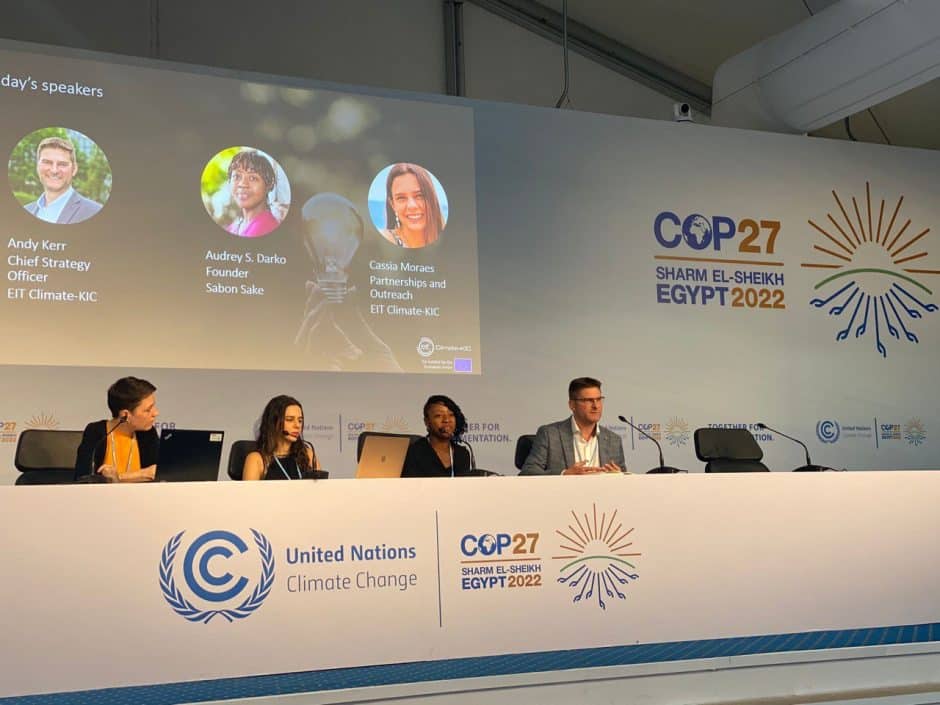COP27 – Supporting local innovation ecosystems in Africa

SHARM EL SHEIKH, Egypt, November 10, 2022 – Africa’s share of global emissions accounts for about 2 per cent of the world’s total. Yet it is one of the regions most negatively affected by climate change.
Climate resilience and the ability of people to adapt to climate risks are at the heart of climate tech efforts. But the solutions must be developed locally to enable faster and easier integration into the existing market, and the economy.
This is one of the findings of the “Adapt, Mitigate and Grow” report recently published by Climate KIC and research firm Briter Bridges on the state of the climate tech ecosystem on the African continent.
Climate KIC is working with local organisations across Africa to support early-stage climate start-ups and build innovation ecosystems on the continent.
Andy Kerr, Chief Strategy Officer, Climate KIC: “We are trying to build the innovation ecosystem to support organisations, governments, investors and entrepreneurs; because we find that bringing those innovation ecosystems together helps to support the growth of new ideas, and new organisations with jobs, skills and investments.”
Audrey S-Darko is a researcher and a farmer from Ghana. She is the Founder and CEO of Sabon Sake, a start-up that equips farmers with the tools to battle soil degradation and enhance their livelihoods. She won the Climate KIC programme Climate Launchpad competition in Ghana in 2019.
“Sabon Sake means to transform, or to make something new again. We are working to transform the mindset of the agriculture communities and the organisations that we partner and work with, about the climate, and the impact on the environment,” she explains.
The start-up uses a circular approach to deliver climate-resilient agricultural solutions that accelerate the regeneration of degraded soils and agricultural productivity in Ghana and sub-Saharan Africa.
Sabon Sake provides environmentally friendly, restorative and cleansing carbon-based soil amendments that cater to restoring biodiversity, improving and sustaining soil health, resilience and fertility, thereby improving food security and the quality of agricultural products.
In addition, Sabon Sake is working to ensure that farmers can access financial assistance with support from corporate organisations and NGOs.
This need for blended finance is one of the main findings of the “Adapt, Mitigate and Grow” report. “To allow climate tech to thrive, we need governments, the private sector, the innovation support mechanism, and we need consumers to be aligned to allow these fantastic young businesses to start to grow and develop,” says Kerr.
Access to finance is even more complicated for women, explains Audrey S-Darko, who participated in Climate KIC Accelerator: “2.3 per cent of women are funded by venture capital. It’s sad. Especially when you know that women are at the frontlines, and they are able to create increased sustainability when they are involved in businesses and in communities.”
Climate KIC, with grants from Irish Aid, is funding pilot projects of five local partners in Tanzania, Uganda, Vietnam and Colombia that aim to better serve and support female entrepreneurs. These organisations intend to carry out a deep transformation of their entrepreneurship programmes to understand how to better serve and support female leaders. The WeClim Equally gender-smart handbook is a guide for integrating a gender perspective into the pilot programmes.
Sharing her story about founding the Youth Climate Leaders, Cassia Moreas explains the importance of capacity building: “Investors expect innovators to be fully ready, but sometimes you need adjustment, some time to find your co-funder.”
Watch back the press conference.
Audrey S-Darko, CEO of Sabon Sake, Andy Kerr, Chief Strategy Officer of Climate KIC and Cassia Moraes, Strategic Programmes Builder at Climate KIC are in Sharm-el-Sheikh at COP27. Contact us at anne-sophie.garrigou@climate-kic.org if you would like an introduction for an interview.
